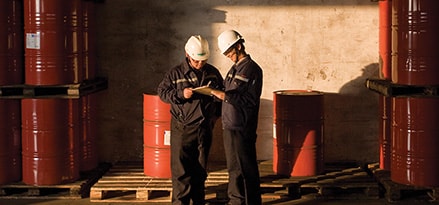Storage and handling study

Lubrication experts analyze your plant’s storage and handling practices and provide feedback to help build an effective lubrication program.
Description
Our highly trained field engineers conduct lubricant storage and handling studies across your plant, providing a comprehensive review and analysis. Their expertise and insights can help you update and improve lubrication practices that can lead to best-in-class performance.
Application
We work with you to:
- Schedule the study to align on objectives and business needs
- Obey all safety/work rules and respect confidentiality
- Conduct a walk-through review of the facility
- Review current storage and handling practices, records of consumption, location of inventory, logistics, manpower resources and skill levels, order break-points, order patterns, etc.
- Identify: trends; critical products; insurance, safety and environmental issues; and any capital or manpower investments that may be needed
Deliverable: An Engineering Service Report documents the findings from the plant lubricant storage and handling study. It contains recommendations for improvements, total cost of ownership, estimated benefits of implementing the recommendations and the expected return on recommended investments.
Common opportunity areas
- Inventory not maintained to optimize lubrication management practices
- Manage contamination control and improve practices
- Lubricants not kept in clean, dry location
- Lubricant containers: exposure to contamination, potential for mixing, not clearly labeled
- Old and obsolete stock
- Automatic lube systems not used or properly maintained/operated
- Lubricant leakage
- Used lubricant handling and disposal
- Real cost of lubricant handling versus purchase cost
- Bulk versus package analysis
- Necessary training to plant personnel
Safety, health and environment
Our field engineers are attuned to the hazards of handling, storing and using petroleum products. They strictly observe safety and environmental rules, as well as ExxonMobil and customer safety practices. They coordinate efforts through designated plant personnel verifying electrical and mechanical lockout and proper tagging prior to working on equipment, and providing recommendations to help reduce hazards.

